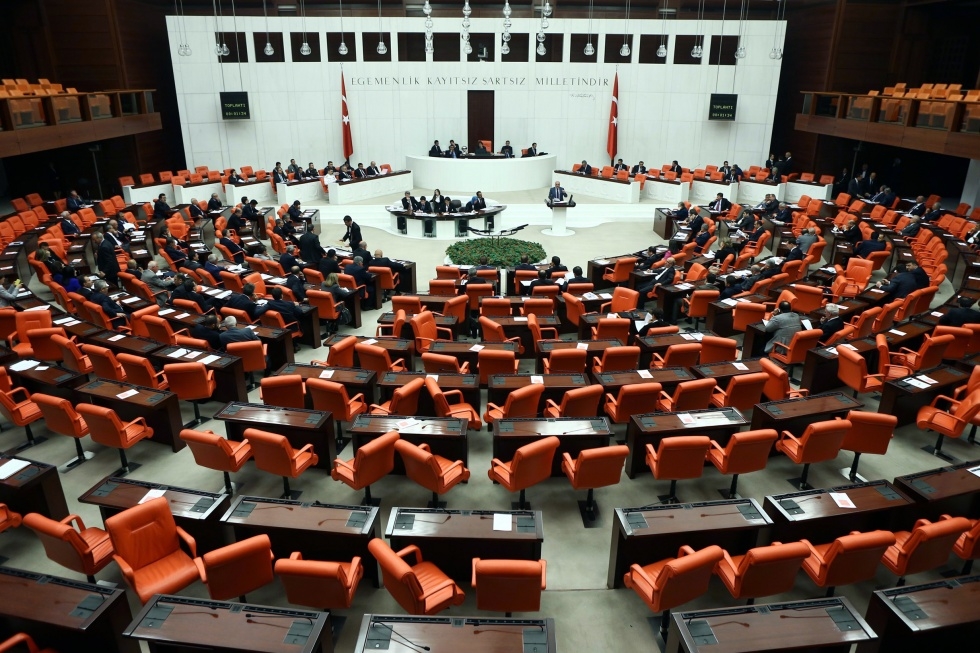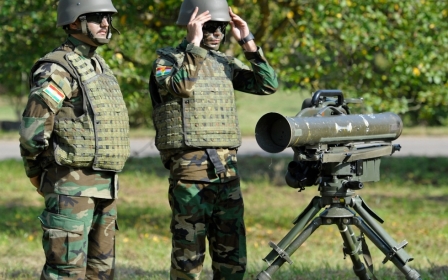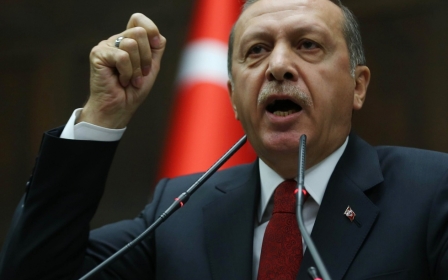What does Turkey's intervention vote say about its intentions?

ISTANBUL: After weeks of speculation, the Turkish parliament on Thursday authorised military action in Syria and Iraq. Adopted as a countermeasure against the rising Islamic State threat, the government of Prime Minister Ahmet Davutoglu has now been authorised to command Turkish armed forces into direct actions across the border and to allow foreign troops to use Turkish bases.
The decision came after a lengthy parliamentary debate, which lasted for five hours prior to voting. Of the total 550 MPs, 298 MPs voted yes, and 98 MPs opposed the motion that will effectively extend the existing military mandate for another year with a wider scope.
While the intense fighting in Kobane between the Kurdish PYD/YPG forces and IS took a dramatic turn overnight on Thursday, Turkey effectively joined the anti-IS coalition after insistent calls from western countries.
After the parliamentary session - a security meeting was chaired by President Recep Tayyip Erdogan - with the prime minister, chief of staff, intelligence and other top officials all in attendance. Following the meeting, Erdogan and Davutoglu both welcomed the decision.
Upon the conclusion of the security meeting, Davutoglu told the press that with this motion, the government caught up with its partners.
"We send a message with this bill,” he said. “That is, regarding our neighbours Iraq and Syria, we have a national interest and national strategy for our borders and our region."
Though the IS threat to Turkey has become pressing in the last few months, as fighting has edged ever closer to its border, Turkey held back and failed to agree on a concrete anti-IS measure until it secured the release of diplomatic hostages, being held by IS.
When IS seized control of Mosul last June it also stormed the Turkish consulate and captured 46 Turks and 3 Iraqis. The hostages were eventually released in late September.
War of the words
For months, especially during the hostage crisis, opposition parties in Turkey blamed the government for remaining passive about the rising IS threat. The main opposition Republican People's Party (CHP) leader Kemal Kilicdaroglu favoured joining the anti-IS coalition, but before Thursday’s parliamentary session, CHP announced that they would not support the motion.
During a press meeting in Ankara, Kilicdaroglu said: "We would support a motion on the struggle against the IS or the PKK; in short, against terrorist organisations. […] But this is not the motion that came to parliament. On the contrary, it is about struggling against Syria."
The same allegations also came from the pro-Kurdish People's Democracy Party (HDP) ranks. On his parliamentary address, HDP MP Ertugrul Kurkcu said: "At the centre of this mandate is the Syrian government and Assad and the PKK, not Islamic State."
Both opposition parties came up with similar arguments, stating that the wording of the motion was poorly made, too broad and very vague.
CHP MP Akif Hamza Cebi argued that the motion is a "permit for war" that only mentions IS and PKK one time, while placing huge emphasis on the Syrian government.
A quick comparison can help shed light on the political wrangling over the vote.
When the US asked the Turkish government's permission to open a second front in northern Iraq before declaring war on Saddam Hussein regime in 2003, the motion of the day specifically mentioned how many troops would be deployed in Turkey, where and for how long. It listed where the security zones – that had been requested by Turkey would be established - and how much aid and economic assistance would be given to Turkey in exchange for its cooperation.
Though the March 2003 motion was rejected in the parliament, most of the MPs knew what they were authorising.
In contrast, the new motion authorises Turkey to take necessary military measures, including sending troops to "foreign countries" and accommodating "foreign troops" in Turkey.
This vague wording brings question marks about what the government is actually aiming for by acquiring the authorisation. According to daily Star columnist and Galatasaray University professor Beril Dedeoglu, the government has intentionally aimed to write an ambiguous document.
"It [Turkey] does not want to specifically target anybody in Syria, but aspires for putting all the potential threats in the same basket," she told MEE.
The purpose of the motion is effectively joining the anti-IS coalition, but no other member of the coalition has such a direct proximity to the militants. Analysts and commentators alike believe that this closeness to the Turkish border, and Turkey's complex relationship with other warring parties in Syria, has forced Ankara to carefully craft its own policy going forward.
According to Ferhat Pirincci, an Associate Professor at Uludag University, although Turkey sees IS as a direct threat, it does not consider the armed group as a cause, but perceives it as a consequence of what happened in Syria over the last three years.
"For Turkey, the reason why IS exists is the regime of [Syrian President] Bashar al-Assad therefore, the motion simultaneously targets the regime and sees it as the source of the problem," he told MEE.
As daily developments and international conjuncture affect the warring parties to gain or lose advantage on the battlefield, Turkey hesitates on making a distinction between them.
"As of today for instance" Pirincci argued, "PYD - the Syrian offshoot of PKK - is not on the priority list compared to IS or the [Syrian] regime. But the aim of the motion is to prepare Turkey for all scenarios; in a way intimidate all the parties on the ground by benefiting from the symbolic value of this all-encompassing document."
Indeed, before IS in Syria made significant gains, and Kurds controlled most of the north. The PYD then went even further and declared three cantons in November 2013, effectively establishing a transitional administration to negotiate autonomy or other options in the post-Assad era. The Syrian National Coalition, which at that time was seen as the opposition’s umbrella authority, and Turkey strongly opposed the declaration.
Turkey has been closely monitoring the situation, and since November 2013 it has supported anti-PYD elements in Syria. Although the US recently considered arming the Kurds, Turkey's equal distance to both PYD and IS indirectly affected the warring capacity of the Kurds against IS, as it prevented the Syrian Kurds from acquiring help from the international community.
According to daily Haberturk columnist and Kadir Has University professor Soli Ozel, the motion targets all terrorist activities in Syria and Iraq.
However, considering recent developments, it is safe to assume that the motion is aimed at the PKK/PYD, he explained.
In this context "Turkey might countenance the fall of Kobane to the hands of IS," he told MEE. "This is why jailed PKK leader Ocalan links the defence of Kobane to the 'peace process', which aims to solve the decades-old Kurdish issue in Turkey."
On Friday, Davutoglu said that Turkey would do "whatever it can so that Kobane does not fall" to IS but as of Friday evening there were no signs that Turkey was planning to mobilise to protect the town.
Analysts now suggest that the wording of the bill has been made purposefully vague to allow Turkey to kill not two, but three birds with one stone: more flexibility in its options, appeasing anti-IS coalition, and further intimidating the armed groups on the ground with a constant reminder of its deterrence.
What's next?
It is expected that Turkish authorities will evaluate the measures against IS and discuss possible scenarios with US-led coalition officials in the upcoming days.
Turkey wants the establishment of safe havens - small security pockets in the Syrian territory that would protect the civilians from the armed conflict and prevent massive refugee influx into Turkey. In addition, next week Turkey will probably sit with the US and bargain on the imposition of a no-fly zone, just as was applied in Iraq between 1991-2003.
It is still unclear how, if and when these measures could be adopted, but there are serious drawbacks that could limit Turkey's options. As a NATO member and respected member of the international community, Turkey has always sought international legitimacy provided by the UN before joining any military intervention.
Uludag University's Pirincci, believes that despite the pressure on its border, Turkey would again wait for such a resolution and would not take any unilateral action in Syria, including the creation of safe havens. But while this was the most likely scenario, there are two developments that might provide Turkey the right to intervene without UN backing, Pirincci adeed.
"If IS attacks the Suleiman Shah tomb - a symbolic Turkish enclave in northern Syria - or if [Turkey] faces another massive refugee influx of hundreds of thousands of people in a short period of time, then Turkey would exercise its right of self-defence," Pirincci said.
Under the current stalemate at the UN Security Council, it is almost certain that Russia - and perhaps China - would block a resolution authorising military action in Syria. Previous attempts to get a solid and united UNSC resolution on the issue have repeatedly failed.
Another solution could be to use the "humanitarian urgency" pretext which could see NATO forces launch a campaign against IS, similar to that seen in Kosovo in 1998.
However, this scenario is also highly unlikely as no other coalition member has as yet declared their interest or support for such measures.
Soli Ozel, a professor at Kadir Has University, has argued that establishing a no-fly zone would be virtually impossible. According to Ozel, the setting up of safe havens in Syria would also be extremely complicated.
"If even the US tacitly consents, could Turkey go against Russia and Iran, or actually send ground forces into a sovereign country?" he asked.
Just hours after the approval of the authorisation, Iran denounced Turkey's decision and Syria warned Turkey against any military action. Iraq too has issued grumblings but no official condemnation as yet.
New MEE newsletter: Jerusalem Dispatch
Sign up to get the latest insights and analysis on Israel-Palestine, alongside Turkey Unpacked and other MEE newsletters
Middle East Eye delivers independent and unrivalled coverage and analysis of the Middle East, North Africa and beyond. To learn more about republishing this content and the associated fees, please fill out this form. More about MEE can be found here.




